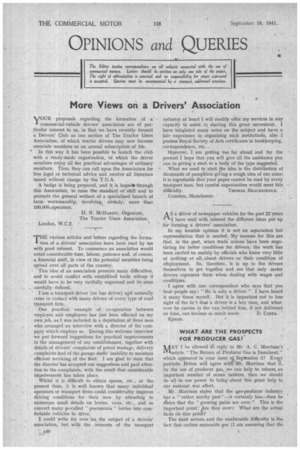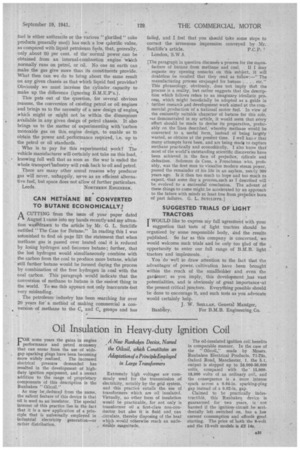OPINIONS and QUERIES
Page 32

Page 33

If you've noticed an error in this article please click here to report it so we can fix it.
More Views on a Drivers' Association
\TOUR proposals regarding the formation of a' A commercial-vehicle drivers' association are of particular interest to us, . in that we have recently formed a Drivers' Club as one section of The TraCtor Users Association, of which tractor drivers may now become associate members at an annual subscripticin of 10s.
in this way it has been possible to launch the club with a ready-made organization, •of which the ckiver members enjoy all the practical advantages of ordinary members. Thus, they can call upon the Association for free legal or technical advice and receive all literature issued without charge by the T.U.A. "
A badge is being prepared, and it is hoped, through this Association, to raise the standard of .skill and to promote the general welfare of a specialized branch of farm workmanship, involving, already, more than 100,000 operators.
D. N. MCHARDY, Organizer, The Tractor Users Association. London, W.C.2.
THE various articles and 'letters regarding the forma1 tion of a drivers' association have been read by me with good interest. To commence an association would entail considerable time, labour, patience and, of course, -a financial start, in view of the potential members being spread over all parts of the country.
This idea of an association presents many difficulties, and to avoid conflict with estahliihel trade unions, it would have to be very tactfully organized and its aims carefplly defined.
I am a transport driver (ex bus driver) altd naturally come in cimtact with many drivers of every type of road transport firm.
One practical example of co-operation between employer and employees has just been effected on my own job, as I was included in a deputation of three men who arranged an interview with a director of the company which employs us. During this welcome interview we put forward Suggestions for practical improvements in the management of our establishment, together with details of drivers' complaints of petrol wastage, delivery complaints Is.nd of the garage staffs' inability to maintain efficient servicing of the feet. .1 am glad to state that . the director has accepted our suggestions and paid attention to the complaints, with the result that considerable improvement has taken place.
Whilst it is difficult to obtain spares, .etc., at the present time, It is well known that many individual operators or transport firms could considerably improve driving conditions for their men by attending to numerous small details onlorries, vans, etc., and so convert many Eo-called " pneumonia " lorries into comfortable vehicles to drive.
I could write for ever on the subject of a driver's' association, but with the interests of the transport A30
industry at heart .I will readily offer my services in any capacity to assist in starting this great movement. I have tabelated many notes on the subject and have a fair experience in organizing such iustitutiolis, also I possess Royal Society of Arts certificates in bookkeeping, correspondence, etc..
However, I am getting too far . ahead and for the present I hope that you will give all the assistance you can in giving a start to a body of the type suggested.
What we need to start the idea is the distribution of thousands of pamphlets giving a rough idea of our aims; it is regrettable that your paper cannot be read by every traasport.Man, but careful organization would meet this
difficulty. THOMAS BRACRGIRDLE. • UrmstOn, .Manchester.
A s a driver of newspaper vehicles for the past 22 years I have read with interest the different ideas put up for forming a drivers' association.
In my humble opinion it is not an association but representation that is needed. My reasons for this are that, in the past, when trade unions have been negotiating for better tonditions for drivers, the work has been carried on mainly by officials who know very little or nothing at all about drivers -or their condition of eteployment. So, therefore, it is up to the drivers themselves to get together and see that only motor drivers represent -them when dealing with wages and conditions.
• I agree with one correspondent who says that you hear people say: "He is only a driver." I have heard it many times myself. But it is important not to lose sight of the faet that a driver is a key man, and whatever he carries in the van behind him, if not delivered on time, can becOme so much waste. D. 'COSTA. Epsom.
W_HAT ARE THE PROSPECTS FOR PRODUCER GAS?
mAy I be allowed tZ) reply to Mr. A. C. Morrison's "'article "The .Return of Producer Gas is Imminent," ,which appeared in your issue of September Eveity patriotic Briton will agree with Mr. Morrison that if,. by. the use of producer gas, .we can help to release an important number of ocean tankers, then we should do all in our power to bring, about this great help to our national war effort.
Mr. Morrison states that the gas-producer industry has a "rather murky past "—it certainly has—then he states that the "growing pains are over." This is the important point: Ike they over? What are the actual facts o'n this point?
The most serious and the unalterable difficulty is the fact that carbon monoxide gas (I am assuming that die
fuel is either anthracite or the various " glorified " coke products generally used) has such a low cialorific value, as compared with liquid petroleum fuels, that, generally, only about GO per cent. of the• normal power an be obtained from an internal-combustion :engine which normally runs on petrol, or oil. No one on earth can make the gas give more than its constituents provide. What then can we do to bring about the same result on any given chassis as that which liquid fuel provides? Obviously we must increase the cylinder, capacity to• make up the difference (ignoring B.M.E.P's.).
This puts out of the question, for several obvious reasons, the conversion of existing petrol or oil engines and brings us to the necessity of a new design of engine, which might or might not be within the dimensions available in any given design of petrol chassis. It also brings us to the matter of experimenting with 'carbon monoxide gas on this engine design, to enable us to obtain the power and-performance required, i.e. up to the petrol or oil standards. '
Who is to pay for this experimental work? The vehicle manufacturer will certainly not take on this load, knowing full well that as soon as the war is ended the whole transport industry will rush back to oil and petrol.
There are many other sound reasons why producer gas will never, unhappily, serve as an efficient alternative fuel, but space does not allow of further particulars.
Leeds. NORTHERN ENGINEER.
CAN METHANE BE CONVERTED TO BUTANE ECONOMICALLY?
A CUTTING from the issue of your paper dated r-t August 1 came into my hands recently-and my attention wasedrawn to the article by Mr. G. L. Sutcliffe entitled "The Case for Butane." In reading this I was astonished to find on" page 521 the statement that when methane gas is passed over heated coal it is reduced by losing hydrogen and becomes butane; further, that the lost hydrogen would simultaneously combine with the carbon from the coal to produce more butane, whilst still further butane would be formed during the process by combination of the free hydrogen in coal with the coal carbon. This paragraph would indicate that the conversion of methane to butane is the easiest thing in the world. To me this appears not only inaccurate 'but very misleading.
The petroleum industry has been searching for over 20 years for' a method of making commercial a conversion of methane to the C, and C„. groups and has
failed, and I feel that you should take some steps to correct the erroneous impression conveyed by Mr.
Sutniffe's article. P.C. P. London, S.W.5.
[The paragraph in question discusses a process for the manu facture of butane from methane and coal. If I may requote my opening remarks on this subject, it will doubtless be recalled that they read as follow:—" The manufacturing process ermisaged for butane . . . etc." This phraseology, obviously, does -not imply that the process is a reality, but rather suggests that the description which follows refers to an imaginary idealistic process, which might beneficially be adopted as a guide in further research and development work aimed at the commercial production of a national motor fuel. In view of the eminently suitable character of butane for this role, .--as demonstrated in my article, it would seem that every effort should be made to devise its preparation, preferably on the lines described,' whereby methane would be converted to a useful form, instead of being largely' wasted, as obtains at the present time. I well knoa that many attempts have been, and are being Made to capture methane practically and econothically. I also know that most of the world's outstanding scientific discoveries have been achieved in the face of prejudice, ridicule and defeatism. -Solomon de Cans, a Frenchman who, probably, was the first man to visualize modem steam power, passed the remainder of his life in an asylum, nearly 300 years ago. Is it then too much to hope and too much to expect, -that some day a process.such as I described will • be evolved to a successful conclusion. The advent of these things to come might be accelerated by an approach -to the future with minds at least free from prejudice born of past failures. G. L. SUICCLIFFE.) SUGGESTED TRIALS OF LIGHT TRACTORS r WOULD like to express my full agreement with your
suggestion that tests of light tractors should be organized by some responsible body, and the results published. So far as this company is concerned, we would welcome such trials and be only too glad of the opportunity to enter our full range of B.M.B. light tractors and implements.
You do well to draw attention to the fact that the advantages of power, cultivation have been brought within the reach of the smallholder and even the gardener; as you imply, this development ,has vast potentialities, and is obviously of great importance-at the present critical juncture. Everything possible should be done to encourage it, and such tests as you advocate would certainly help.
J. W. SHILLAN, General ManAger,
Banbtry. For B.M.B. Engineering Co.




















































